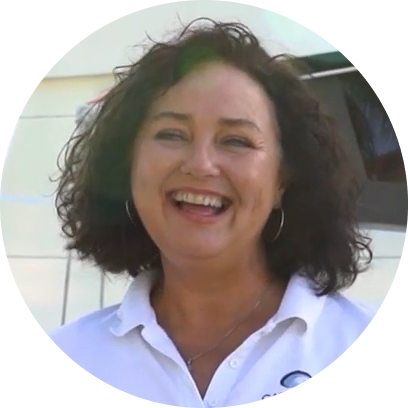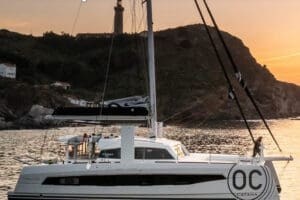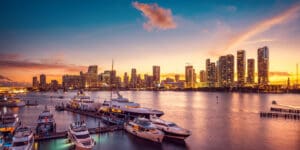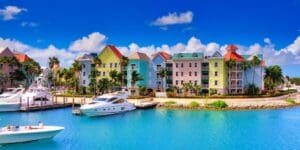Overseas Radio Network – Inexperienced Cruisers, Offset Yacht Costs, & Essential Yacht Equipment
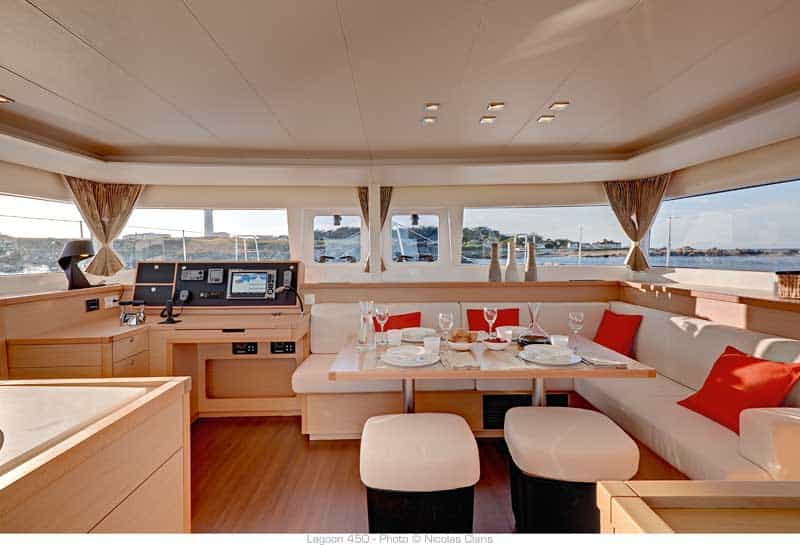 In the Overseas Radio Network Show 2, Segment 4, Stephen and Estelle talk about:
In the Overseas Radio Network Show 2, Segment 4, Stephen and Estelle talk about:
- Inexperienced cruisers
- Cruising with power yachts
- Seeing the world on a yacht placed in charter
- Offset the cost of a yacht
- What is critical equipment needed to cruise?
GARY FRETZ: I want to welcome you back to “Yachts the Perfect Escape Vehicle”. Today, we are talking to Stephen and Estelle Cockcroft and we were talking about ways to get experience to go cruising.
For a transcript of this podcast, click “read more” below.
Inexperienced Cruisers
GARY: Did you run into any really inexperienced cruisers and how did they happily and safely cope with that?
STEPHEN COCKCROFT: We ran in to a lot of inexperienced cruisers. And the Bahamas is a good starting ground for a lot of cruisers. You never have to sail overnight. You can day sail away. In fact, we were down in Trinidad. We met a couple on a boat that never overnight and they were in Trinidad which I find completely unbelievable. But that explained to me that they just plan day hops. So there are a lot of people out there that aren’t the intrepid sailors that you would expect. They’re just people that love the lifestyle and love living aboard. And do a very benign form of cruising so they, we met a lot of people that wouldn’t venture over to cross big waters.
ESTELLE COCKCROFT: And then, of course, if you really want to see some of our plonkers, we call them, go to our website and go to our Plonker Club and see how these people cope and what they do and why they do it. [See information about our sailing school graduates and clients.]
GARY: The website is?
ESTELLE: Our website is www.catamaranguru.com .
Cruising with Power Yachts
GARY: Now, we have been talking about sailing yachts mainly because they make economical cruisers. But you could do it on a motor yacht as well, right? It just costs a lot more for fuel.
STEPHEN: Yes, you get a fuel boat, you don’t get a wind boat. So generally I feel that a sailboat is safer. I like the catamaran for stability. It has 2 engines, plus it has a mast and sails if you lose your engines for whatever reasons, bad fuels for whatever reasons, you’ve got sails. You have a secondary form of propulsion, so I really feel that catamaran is the perfect cross-over vessel.
GARY: Did you ever lose your engine for a long period of time?
STEPHEN: Oh, yeah, we have lost our engines quite a number of times. Estelle actually had to sail me into an anchorage one day in the Mediterranean and the sail and drop anchor so we could attend to the engine. And I have lost the engine a few times on the catamaran, but again with the catamaran if you lose an engine well, you got another one.
GARY: But what if you have no experience you can actually operate your sailing like the motor yacht you just don’t go very fast, right?
STEPHEN: Yeah, you would learn to sail. Everybody puts the sails up and eventually you figure it out. That’s why it is really good to go and do a course in ASA sailing course so you understand the fundamentals of sailing. You don’t have to be an America’s Cup quality sailor. If you understand the fundamentals, you’re just fine. It’s not really rocket science to learn to sail.
Seeing the World on a Yacht Placed in Charter
GARY: Now, I heard about some people that will buy a charter yacht and they put it in charter and they get to use other boats around the world that are similar and they get to go to like 30 different places. Can you tell me about that?
STEPHEN: Yes, I am actually associated with a privately owned charter, its Dream Yacht Charters. It has bases in 32 places around the world. The reason I know them this well is because they are in Madagascar and Seychelles Mauritius. We have been to all these places. So we have seen them around the world. And there are programs where you can actually buy a boat, put it in their program. And you end up paying about 50% of the boat off by letting other people charter your boat and pay for the use of it. But part of their program is that they will guarantee you an annual income on the boat which covers your mortgage and they allow up to 12 weeks of owner exchange. So you could buy a boat and put it into the British Virgins Islands and you could sail for the next five years and never ever actually even get on your boat.
You could sail to Tahiti, Madagascar, Seychelles…as if you are sailing on your own boat. So you could sail around the world in your part time or your vacation by placing a boat into this guaranteed program which a lot of people do.
GARY: So it is kind of like practice-cruising. You get to go on your vacation time to use a boat in different parts of the world and you can literally sail around the world in 5 years, right?
STEPHEN: Yeah, yeah.
ESTELLE: You know, Gary, this is a wonderful way to own your boat, get your boat. If you don’t have a $100,000 or $500,000 or whatever the boat would cost you to put down for a new boat, this is really a great way to do it.
Offset the Cost of a Yacht
GARY: Now, not everybody has $500,000 to buy a boat with. Are there ways to offset the cost in buying a boat and maybe talk a little bit about financing I have heard about these programs where you can buy a boat for half of or something you get the charter company to pay for half the boat or something like that.
STEPHEN: Oh yeah, they are some programs. Dream Yacht, I believe, has one as well where you pay for half the boat and after 5 years they would have paid for half the boat. And you will end up with the boat for $1 so you will get the boat at half price, you know, after 5 years.
It is a very good way to get the boat, really a bigger better boat, than you could afford if you just had to pay cash and then not take advantage of these charter opportunities.
GARY: Now, when they are paying for half the boat what else do you get in these programs? Do you get guaranteed income in addition and do they pay for all the expenses? How does that work?
STEPHEN: Depends on the program it is quite a broad subject, Gary. You have performance programs where you participate in the income, you have guaranteed programs where they give you a guaranteed income and I believe in the case of the 50/50, you would pay your 50% and you wouldn’t get any income but you have no out of pocket expenses. The charter company would pay all the expenses for the 5 years at the end of the term give you the boat.
GARY: Wow, it sounds like a very good program to think about? And where can they find out more about that?
STEPHEN: They can go to our website catamaranguru.com or dreamyachtcharters.com where most of this information is available.
What is Critical Equipment Needed to Cruise?
GARY: Okay, that all sounds good. Now, let me ask you something. What do you think the critical equipment is to have on a boat? And is there equipment you think you need that you really never use?
Stove
ESTELLE: Number one is a stove. I want a 3-burner stove. That’s just the way it is in my galley.
GARY: Wait, why 3 burners?
ESTELLE: Well, that’s the way you juggle cooking and the 3-burner, in my experience, is just the way to do it. My oven has to be a great oven, because I love baking. And I am sort of a connoisseur on bread baking so I used to do classes in the anchorages where women would come over and I would teach them how to bake bread.
Fridge and Freezer
The next thing would be my fridge and freezer. Cannot live without that, a good fridge. Freezers: not all boats have freezers, but if you can afford one and if you have space for one, definitely the way to go.
Shade Cloths
As far as shade, if you live in the Caribbean or you live in the Mediterranean, you get burned up. And the only way to get away from it is good shade cloths.
Anchor
STEPHEN: Well, from the guy who hangs outside, again, probably the most important thing that I, one of the most important pieces of equipment in my opinion is the anchor. In order not to blow your budget sitting in marinas paying expensive marina fees, you need a good anchor. So that’s the one thing I would really pay attention to, it is a subject that would take about 5 of this programs to discuss.
Water Maker
The other thing that I really think, I didn’t start out with one, but I really think it is important today, is a water maker which gives you independence from have to go short of jerry cans and fill jerry can and to top up your tanks.
Power Systems
The other critical issue, of course, is power if you have a generator that’s great, but it uses fuel which costs money. So obviously, generators require maintenance. On our last 2 boats we had good solar arrays and we have had good wind generators which essentially give you free power so you don’t have to be running your generator all the time.
A good set of sails is always good because if you are going to sail at least you want to sail and go in the right direction.
Dinghy and Davits
ESTELLE: What about our dinghy, Stephen? That is like our car, you know. So you want a really good dinghy with boat motor we have seen some more stories in anchorages where people where their engine breaks down and they are left out to sea and we would have to rescue them so that’s one thing you would have to spend money on.
STEPHEN: That is very good point, Estelle. Dinghy…we started off, well… I really don’t want to talk about our first dinghy we had a seagull motor and, of course, the only moving part of a seagull motor is the owner. But a dinghy is critical and good davit is all critical to lift your dinghy every night so it doesn’t disappear.
GARY: Okay, well, we are running out of time and I want to thank you all for being here we are going to continue this discussion next week, we are live at 3:00 PM on Thursdays eastern US time and I want to thank our listeners for joining us you can catch reruns of this show at various times just go to the OverseasRadioNetwork.com website and look at the schedule you will see us on there.
So this has been Gary Fretz, Stephen Cockcroft, Estelle Cockcroft on “Yachts the Perfect Escape Vehicle” only on the Overseas Radio Network.
